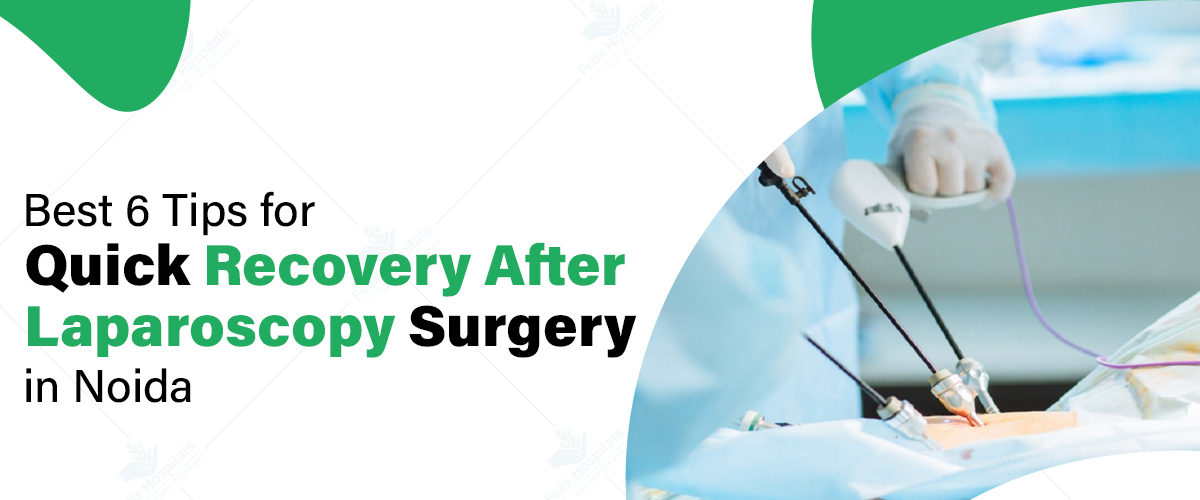
Subscribe to our

Recovery from laparoscopy surgery can be a demanding process, with the duration of healing varying from person to person. The recovery timeline is influenced by several factors, including the type of surgery performed, your overall health, the quality of your support system, and your commitment to the recovery process. The actions you take during your recovery period can significantly impact the speed and effectiveness of your healing.
For individuals who have recently undergone laparoscopy for diagnostic purposes, this blog provides essential recovery tips. For those considering the procedure, it offers insights into what laparoscopy entails and what to expect during the post-surgery recovery phase. If you are seeking expert care, consider consulting with a top Laparoscopy Surgery Hospital in Noida to ensure the highest standards of medical care and support throughout your recovery journey.
At Felix Hospital, we're ready to assist you for Laparoscopy Surgery. Secure your appointment today by calling +91 9667064100.
A Laparoscopy Surgery is a minimally invasive procedure performed by your surgeon to diagnose issues in your abdominal or pelvic area. The procedure utilizes a laparoscope, a thin, telescopic rod equipped with a video camera. This instrument is inserted through a small incision in the abdomen, typically measuring half an inch or less. In some cases, surgeons may make up to three additional incisions to insert other surgical tools, allowing them to thoroughly examine the internal organs and identify any problems.
The camera on the laparoscope transmits real-time images of the inside of the abdomen or pelvis to a monitor. These images enable the surgeon to precisely guide their hand movements during the procedure.
Healthcare providers may recommend a laparoscopy when other diagnostic tests fail to determine the cause of a condition. Additionally, laparoscopy can be used to collect tissue samples (biopsies) for further testing.
1. Wear Loose Clothes
After laparoscopy surgery, it is important to wear loose-fitting clothes to avoid irritating the surgical incisions. Tight clothing can cause discomfort and slow down the healing process. Opt for comfortable, breathable fabrics that allow your body to move freely without putting pressure on the surgical sites.
2. Attend Follow-Up Appointments
Follow-up appointments are crucial to monitor your recovery progress. These visits allow your surgeon to assess the healing of your incisions, check for any signs of infection, and address any concerns you may have. Regular follow-ups ensure that any potential complications are detected early and managed effectively.
3. Rest and Recuperate
Adequate rest is essential for your body to heal properly. Ensure you get plenty of sleep and avoid strenuous activities that could strain your incisions. While it may be tempting to resume your normal routine quickly, allowing your body the time it needs to recover will lead to a faster and more complete healing process.
4. Manage Pain Effectively
Pain management is a crucial aspect of post-operative care. Your doctor will prescribe pain medications to help manage discomfort. It is important to take these medications as directed and not to skip doses. If you experience severe pain or any side effects from the medication, consult your doctor immediately.
5. Eat Healthily
A nutritious diet plays a significant role in your recovery. Consuming a balanced diet rich in vitamins, minerals, and protein helps your body repair tissues and regain strength. Include plenty of fruits, vegetables, lean proteins, and whole grains in your meals. Staying hydrated is equally important, so drink plenty of water.
6. Slowly Reintroduce Activities
Gradually reintroducing physical activities is important for your recovery. Start with light activities such as short walks to improve blood circulation and prevent stiffness. Avoid heavy lifting or intense exercise until your doctor gives you the green light. Listening to your body and not pushing yourself too hard will prevent setbacks in your recovery.
Dr. Ritesh Agarwal, with over 15 years of distinguished experience, is highly skilled in General, Laparoscopic, Laser, Vascular, and Proctology Surgeries. His expertise encompasses a wide range of open and laparoscopic general surgeries, including laparoscopic cholecystectomy (gallbladder stone removal), hernia repair, laparotomy, and non-cancerous breast surgeries such as the treatment of breast lumps, breast pain, and nipple discharge. Dr. Agarwal's comprehensive knowledge and advanced surgical skills ensure optimal care and successful outcomes for his patients.
Book your Consultation with our expert Laparoscopy Surgeon. Call now with just a click on - +91 9667064100.
Recovering from Laparoscopy Surgery requires a combination of rest, proper care, and gradual reintroduction of activities. By following these six tips—wearing loose clothes, attending follow-up appointments, resting adequately, managing pain effectively, eating healthily, and slowly reintroducing activities—you can ensure a smooth and quick recovery. Always adhere to your doctor's advice and guidelines, and do not hesitate to reach out to your healthcare provider if you have any concerns during your recovery process. At Felix Hospital in Noida, our dedicated team is here to support you every step of the way, ensuring a successful and speedy recovery.
How to Speed Up Recovery from Laparoscopic Surgery?
How Many Days Rest After Laparoscopic Surgery?
How to Get Comfortable After a Laparoscopy?
How Do You Get Rid of Pain After Laparoscopy?
What Are the Don'ts After Laparoscopy?
How to Relieve Gas After Laparoscopic Surgery?
What Is the Best Food to Eat After Laparoscopic Surgery?
Is Walking Good After Laparoscopy?